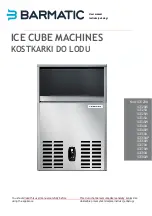
Ÿ
Ÿ
Ÿ
ENGLISH
The consistency can be adjusted by adding some water or flour,
one spoon at a time, and waiting for some minutes until it is blended
into the dough and before adding something more, if needed.
- All the ingredients, including the liquids, must be at room temperature.
- Two rising phases are available for the NORMAL, FRENCH,
WHOLEMEAL, SWEET and SANDWICH programs. At the beginning of
the second rising cycle, the appliance emits a series of beeps. Fruit,
nuts or special ingredients must be added during the second rising
phase.
- The appliance can work optimally at different room temperatures, but
the temperature difference between a cold environment and a hot one
can influence the size and quality of the bread because of the rising.
It is recommended to use the appliance in a tempered environment.
- Never open the appliance lid during the rising and baking phases: the
sudden change of temperature may cause the dough to lose its
swelling.
- Given the many factors that contribute to make bread (type of yeast,
room temperature, air humidity, etc.) any ‘bad’ results are not attributable
to the malfunctioning of the appliance but to these factors.
1
2
3
SUGGESTIONS ON PREPARING THE BREAD
- To achieve a good result, especially with a recipe which has never
been experienced before, it is necessary to check if the dough
consistency is correct.
After about 10 minutes from the beginning of the working, observe
the dough appearance through the viewing window
(4)
: its surface
must be quite homogeneous and it must move around the basket
without crumbling nor remaining attached to the walls.
In order to get a more precise idea about it, observe the three
pictures below. The first one shows a too hard dough, the second
one a too soft dough and the third one, on the contrary, a dough with
the correct consistency.
















































